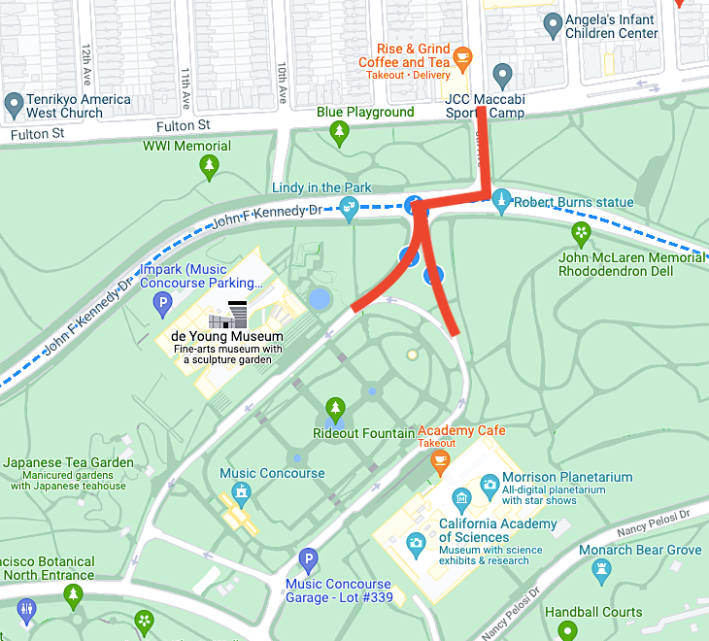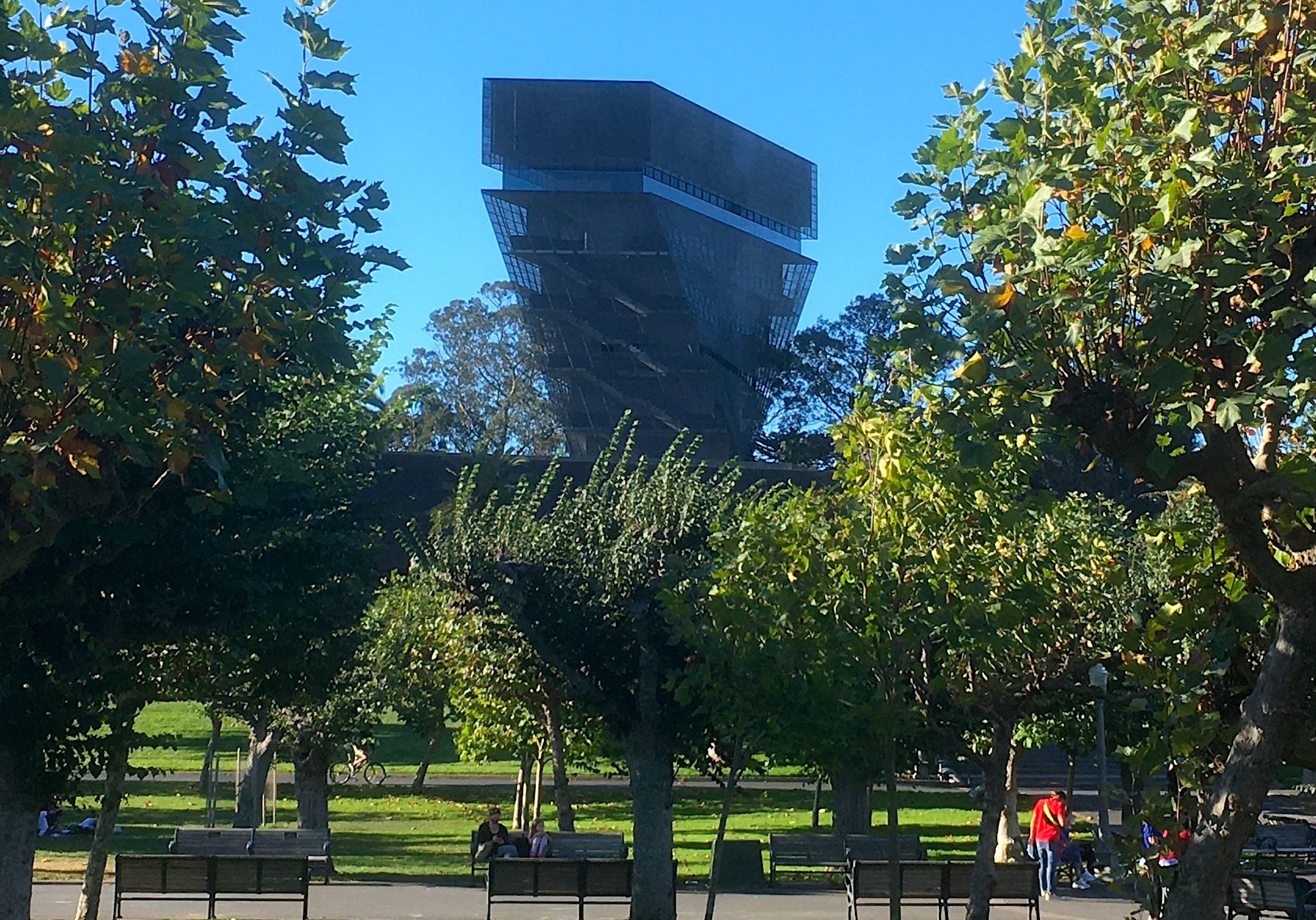This article first appeared in the Frisc and is reprinted with permission.
Two weeks ago, the fight over cars in Golden Gate Park seemed to come to a compromise. Sup. Connie Chan, who represents the Richmond district along the north side of the city’s iconic park, floated an idea for a “car-free” John F. Kennedy Drive, and her press release included enthusiastic quotes of support from transit and pedestrian advocates and the park’s top museum executives.
Upon closer look, though, Chan’s proposal raises plenty of questions, starting with the name. Dubbed the “Beach to Bay” car-free connection, the plan only addresses roads in Golden Gate Park. More important is that it’s not exactly car-free. The resolution calls for a crucial intersection within the park to reopen to cars, creating a complicated break in the car-free flow.
What’s more, a map accompanying Chan’s proposal also shows parking spots on JFK between 8th and 10th avenues, a section that’s supposed to be car-free. Kelly Groth, a Chan aide, said the map reflected an “earlier draft version” to keep disability-accessible parking spaces and will be updated; as of today, the map remains part of the official proposal.
The plan itself, scheduled for a Transportation and Land Use committee hearing on Sept. 20, is a resolution, not an ordinance — meaning that its passage would only be a statement of support and not legally binding.
Meanwhile, transit planning officials continue work on a separate recommendation that they aim to present to the Board of Supervisors by the end of the year.
Chan’s office would not say whether there was a plan to have “Beach to Bay” become law in the future. The resolution comes a month after the Great Highway reopened to cars, and the supervisor’s role in the reopening spurred a local environmental group to withdraw support for her, as The Frisc first reported.
The Frisc reached out to the walk and bike advocates who lent support to Chan’s JFK plan, to ask about the map showing the parking spaces and having cars cut across JFK. Janice Li of the SF Bicycle Coalition did not respond, and Jodie Medeiros of Walk SF would not comment on the record.
Matt Brezina, an organizer with KidSafe SF who was not quoted in Chan’s press release, is happy that the District 1 supervisor is addressing the issue. “If the values are that we maintain this beautiful car-free space, and that’s truly what [Chan’s] goal is, then we love the idea of her joining our side in this movement,” he said. “I would applaud her support and her rallying the other supervisors’ support.”
But he does have reservations, such as the plan to reintroduce through-traffic to the segment of 8th Avenue between Fulton Street and the Music Concourse, which would cut across car-free JFK. (See map.) Right now only the Muni 44 bus can drive on this stretch. Brezina worries that reintroducing private vehicles would slow the bus down.

Safety could be an issue. It’s unclear how the odd intersection, which requires a dog-leg maneuver to cross, would regulate cars and keep pedestrians and bicyclists out of harm’s way as they move from one car-free section of JFK to the other. The proposal does not specify if a traffic light or other infrastructure would be required.
The extra access also seems redundant, because cars don’t need surface streets to get from the Richmond district to the Music Concourse and museums. The parking garage under the concourse is accessible from Fulton and 10th Avenue and can be used for pickups and drop-offs free of charge. “For a disabled patron, the closest access to the museums is in the garage,” Brezina added.
Garage reportage
The 800-space underground garage, which was carved out of the Golden Gate Park soil and opened in 2005, has become the central component in the discussion about a permanently car-free JFK Drive. As The Frisc reported in April, lowering the expensive rates — $6.25 per hour on weekends and weekday evenings — could make trips to the park easier for low-income San Franciscans, residents of far-flung neighborhoods, and people with mobility limitations who can’t take Muni.
Activists say lower rates would address the access issues raised by Sup. Shamann Walton, replacing the free parking that was lost with the closure of JFK Drive. Plus, there’s plenty of space, at least during the week: A 2019 Recreation and Parks Department study found that the garage did not exceed 60 percent capacity on weekdays. (The study also found that the garage was almost full on weekends.) Even the institutions agree: Back in April, a spokesperson for the de Young told The Frisc that the museums “have also been advocating for lowered rates in the garage, but to little effect.”
In fact, they’ve had some control for years without the rates coming down. That’s because the sole entity with the power to change the garage prices is a nonprofit called the Music Concourse Community Partnership (MCCP), and five of its eight directors and employees are connected to the museums, including Academy of Sciences CFO Mike McGee.
Another director is Eric Foster, the CEO of Swinerton, the construction company that built the garage. MCCP entered a debt agreement with Swinerton in 2009 and still owed the company more than $870,000 as of last year, according to audited financial statements. The same statements show that MCCP owes the California Academy of Sciences and the Fine Arts Museums Foundation over $2.5 million on a loan to finance garage construction.
MCCP president Jan Berckefeldt is also executive director of the Maybeck Foundation, a nonprofit that seeks to preserve the work of early 20th-century architect Bernard Maybeck, including SF’s own Palace of Fine Arts. (The Maybeck Foundation reported raising more than $20 million for the Palace’s restoration in 2010.)
According to public tax records, Berckefeldt devotes about 3.5 hours per week to the MCCP, and is the only member of the MCCP board that has collected a check since 2012. (Former MCCP controller John Ryan also collected about $20,000 before then). As president, she has earned between $25,000 and $32,000 per year each year since 2016. Her salary was more variable before 2016; in 2015, she earned only $14,000, while in 2011 she earned $41,000. This money comes entirely from parking garage revenue, which is the nonprofit’s single source of funding.
What Berckefeldt does to earn this salary is unclear. According to MCCP’s tax forms, the organization’s mission is to “complete and operate” the garage. Garage construction was completed in 2005, and MCCP employs an outside operator called Impark to manage day-to-day garage operations.

Berckefeldt did not answer emailed questions about her duties or the possibility of subsidized parking for some San Franciscans, but she did write to The Frisc that the nonprofit “is not involved in conversations about the future of JFK Drive and we take no position on it.” As far as we can tell, this is the first public comment from Berckefeldt about the MCCP since 2012, when she was quoted in the Westside Observer neighborhood newspaper. The MCCP does not hold public meetings.
Rate of change
There is some political momentum to change the parking rates. Next week, the city’s Budget and Finance Committee is scheduled to discuss an ordinance to authorize the city’s transit agency SFMTA to set rates at the GGP garage and several other parking facilities. If the board approves the change, SFMTA plans to implement demand responsive pricing, which would make parking cheaper when the garage has lots of vacant spots and more expensive when it’s filling up with cars.
This is how all kinds of services operate, from airfares and pro sports tickets to Uber and Lyft rides. But it wouldn’t likely make much difference for working people living far from the park, who may only have time to visit during peak weekend times when the fees will be onerous.
With her resolution, Chan is also urging changes, specifically four hours of free parking for residents of historically underserved zip codes (94112, 94124, 94133, and 94134) and people who have an EBT or Medi-Cal card.
The Frisc reached out to the mayor’s office, SFMTA, and Recreation and Parks, which could end up with some say over the parking rates. None would commit to discounts or subsidies based on customers’ place of residence or income levels. However, Mayor Breed’s spokesperson Jeff Cretan told The Frisc that lower prices in the evenings and mornings and other discounts aren’t out of the question.
SFMTA spokesperson Erica Kato said the city has a “no discounted or free parking” policy, but that Rec and Parks could suggest special rates. Rec and Parks spokesperson Tamara Aparton said via email that the department will evaluate pricing schemes “to determine the best approach for this garage,” but did not comment on specific proposals.
No matter what the changes, however, the MCCP will still have to approve them. Aparton explained that the garage fees help MCCP pay off its loan, so it cannot accept changes that hinder those payments. Once the debt is paid, Aparton added, garage control would be transferred to Rec and Parks.
We could be waiting a while. According to its audited financials, MCCP estimates that it will repay the debt by the end of 2038.
***
Max Harrison-Caldwell is a freelance journalist.






